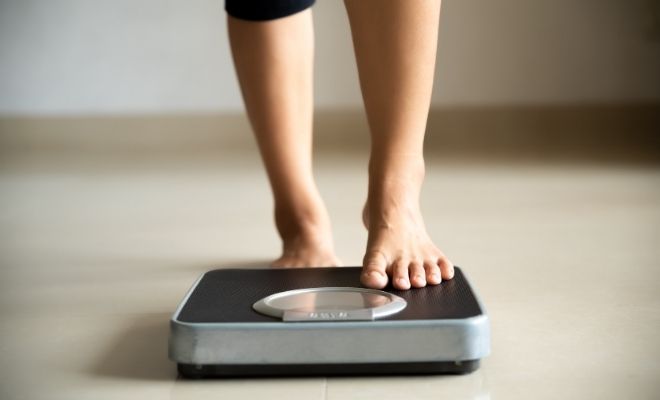We know there are many reasons why we lose weight when we’re not even looking for it. Some of those reasons may be the origin of disease, fast digestion or some major problems. Now, many people have mentioned that some of the influencing factors can be both stress and anxiety. Despite the fact that not everyone thinks the same and in many ways this seems true, but in many others it does not…

For this reason, we have decided to consult the psychologist escapes that she can tell us if anxiety can cause weight loss. Is it possible to lose weight due to anxiety?
However, to first understand if this condition is possible, we must know a little more in depth what anxiety is and how it affects. So keep reading.
Anxiety and its health consequences
Despite what is popularly said, anxiety is not an emotion or feeling, it is a sensation; this understood as the experience of the bodily referent on which emotions are based. It is thus that we know as anxiety the normally unpleasant bodily sensation (chest tightness, agitation, nervousness, and lightheadedness) and that is usually accompanied or derived from feelings of fear, restlessness and fear. This usually causes the person suffering from it to sweat, feel tense and uncomfortable, and suffer from palpitations. However, it is important to distinguish when it is really an anxiety disorder or when it is the anxiety that can be derived from stress caused by school or work; since the first can generate fear that is not temporary and becomes overwhelming, and the second could give an energy boost or help focus.
When it comes to an anxiety disorder, the patient suffering from it experiences conditions where the anxiety worsens over time. However, there are different types of anxiety disorders, including:
Phobias: Intense fear of something that poses little or no real danger.
Generalized anxiety disorder: refers to people who can worry for at least 6 months about health, family, money or work, being excessive worries when experiencing them every day.
Panic disorder: refers to sudden attacks and repeated moments of fear without actually being in danger. People with panic disorder experience constant panic.
Now, knowing what generally causes anxiety, we can ask ourselves…
Can anxiety cause weight loss?
Like many diseases, anxiety can actually cause weight loss. Most anxiety symptoms, like stress, are physiological in nature and reflect activation of the sympathetic and parasympathetic nervous systems. Anxiety is itself the physiological response to the activation of the nervous system and can cause symptoms of hyper activation such as digestive activity, construction of peripheral blood vessels, increased heart rate, among others. This is due to the fact that the signal that the organism receives is to escape from something that threatens the integrity of the person.
Having said this, we can understand the reason for the patient’s weight loss. However, seeing this condition a little deeper we can take into account the following:
In periods of stress and anxiety, when the disorder has not yet paralyzed us, it is normal for us to have a frenetic activity that makes us burn more calories than usual. This is one of the reasons why we can lose weight with anxiety, although the truth is that we are not facing one of the healthiest weight loss methods.
Another reason that can make us lose weight due to anxiety is a lack of appetite. Without the need for us to be more active, nerves, tension and worry can make us not feel like eating. In addition, when we suffer from an anxiety disorder, it is common for us not to follow our usual daily routines, so we can skip some meals or think that we don’t even have time to eat.
To respond to stress caused by anxiety, the body shuts down metabolic function, causing fuel to be burned rapidly. The more energy waste there is, the more energy the body will need, but if it does not receive enough through food, it will try to get it through the body’s fat reserves.
Due to the increase in nervous energy that a person suffering from anxiety has, it makes it difficult and relax. So the fatigue becomes constant and much more energy is needed to mobilize, which causes the body to use even more what it finds in food, causing more weight loss and other stomach and digestive damage due to the tension that is increasing.
One of the symptoms of anxiety is stomach, heartburn or heaviness. That can cause us to eat less and less quantity for not suffering this type of discomfort. In addition, some medications that are included in the drug treatment for anxiety can cause weight loss.
Despite the aforementioned, weight loss caused by anxiety is usually strange and not harmful in some cases, since the body can maintain a suitable weight to sustain itself. But in case this is not the case, it must be treated quickly because it can carry multiple risks that we detail below.
Risks of losing weight due to anxiety
Although the vast majority of women, those who suffer from anxiety and those who do not, want to lose a few kilos effortlessly, we can affirm without a doubt that weight loss caused by anxiety is not the diet they are looking for. There are many health risks of this weight loss that is also closely related to depression and lack of motivation.
Anxiety not only causes weight loss, but also loss of muscle mass, with the risks that this entails of lack of mobility, fractures, and loss of energy and vitality. Something that we must avoid at all costs when we are faced with an anxiety disorder, since we are going to need all the strength possible.
In addition, losing weight due to anxiety is coupled with a weakening of the immune system, with weakened defenses and, therefore, we are more vulnerable to infections. In any case, it should be noted that a visit to the doctor is mandatory in this situation of losing weight due to anxiety to rule out any other disease.
What to do if you are losing weight due to anxiety?
It is important that, if you experience any of the above, you consult a specialist, since suffering from an anxiety disorder should be treated as soon as possible.
However, some tips that can be followed before and during treatment with the specialist include:
Maintain clear and question the veracity of the thoughts that are causing fear and leading to anxiety.
Make at least 3 to 5 breaths consciously (bringing awareness of the way air enters and leaves our body) without trying to modify it, just observing.
Make a list of concerns, fears and pending issues and then accommodate them to give them a moment of resolution.
Make an action plan.
Share this experience with someone.
Connection meditation with the environment: close your eyes, become aware of the connection you have first with the people closest to you, then friends, colleagues and neighbors, then the neighborhood, city, country and finally the whole world. Send positive intentions to everyone. It is documented that those who send positive intentions experience feelings of spaciousness, fullness, and joy.
Cost-benefit analysis technique: make a list of the advantages and disadvantages of having the belief or thought that is generating the feeling of anxiety. Not the pros and cons of living with anxiety, but living with that belief or thought and find out what happens with this exercise.






